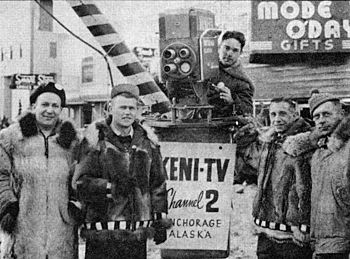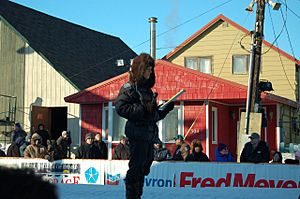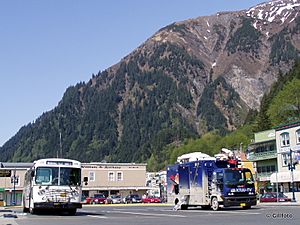KTUU-TV facts for kids
 |
|
| Anchorage, Alaska United States |
|
|---|---|
| Channels | Digital: 10 (VHF) Virtual: 2 |
| Branding | Channel 2 (general) Alaska's News Source (newscasts) |
| Programming | |
| Affiliations | |
| Ownership | |
| Owner | Gray Television (Gray Television Licensee, LLC) |
|
Sister stations
|
KAUU KATH-LD |
| History | |
| Founded | December 14, 1953 |
|
Former call signs
|
KFIA (1953–1955) KENI-TV (1955–1981) |
|
Former channel number(s)
|
Analog: 2 (VHF, 1953–2009) |
|
Former affiliations
|
Primary: NBC/ABC (joint primary, 1953–1967) ABC (1967–1971) Secondary: NBC (1967-1970) PBS (The Electric Company, 1970–1975) |
|
Call sign meaning
|
"TUU" sounds like "two" |
| Technical information | |
|
Licensing authority
|
FCC |
| Facility ID | 10173 |
| ERP | 50 kW |
| HAAT | 240 m (787 ft) |
| Transmitter coordinates | 61°25′20″N 149°52′28″W / 61.42222°N 149.87444°W |
| Links | |
|
Public license information
|
Profile LMS |
KTUU-TV (channel 2) is a television station located in Anchorage, Alaska. It is connected with the NBC television network. This station is owned by Gray Television. It also works with KAUU (channel 5), which is linked to both CBS and MyNetworkTV.
Both stations share their main offices in midtown Anchorage. KTUU-TV's transmitter is in Knik, Alaska. Some of KTUU-TV's shows are sent to smaller, rural towns. This happens through low-power translators as part of the Alaska Rural Communications Service (ARCS).
Contents
The Story of KTUU-TV

The idea for channel 2 in Anchorage started on July 29, 1953. Two people, Keith Kiggins and Richard R. Rollins, got permission to build the station. It was first called KFIA, which stood for "First in Anchorage." They started building right away, putting an antenna on top of the Westward Hotel.
On the same day, another station, KTVA (channel 11), also got permission to build. This started a race to see which station would be the first to broadcast TV in Alaska. KFIA thought it would win. It announced its first test broadcast for October 15. But it didn't work that night.
Two days later, on October 17, the very first TV test signal in Alaska was sent out. However, KFIA missed its planned start date of November 1. Equipment needed for good picture quality arrived late. This pushed back the start date twice. KFIA finally started broadcasting on December 14, 1953. But it wasn't the first. KTVA had started on December 11. Also, a cable system in Ketchikan had already offered TV shows even earlier.
Changes in Ownership and Name
In 1954, Midnight Sun Broadcasting bought the station. The station's call letters changed to KENI-TV in 1955. That year, it moved into the Fourth Avenue Theatre building downtown. Midnight Sun Broadcasting later sold KENI-TV and other stations to All-Alaska Broadcasting Company in 1960.
Broadcasting in Color and Network Changes
On September 19, 1966, channel 2 made history. It became the first station in Alaska to broadcast in color. It showed the first episode of the ABC show That Girl.
At first, the station shared its main connection with both NBC and ABC. But on October 1, 1967, it mostly became an ABC station. It kept NBC as a secondary connection. This was because ABC had more shows available on film. Channel 2 became a full-time ABC station in 1970. Then, in October 1971, channel 2 and KHAR (channel 13) switched networks. Channel 2 went back to NBC, and KHAR became KIMO.
Channel 2 also showed some PBS programs, like The Electric Company. This continued until KAKM started broadcasting in 1975. For many years, KTUU was the only full-time NBC station in Alaska. On June 3, 1981, the station was sold again. Its call letters changed to KTUU-TV on June 10, 1981.
Website and Rural Coverage Issues
In August 2010, KTUU updated its website. It partnered with Tribune Company to improve its online presence.
In November 2013, KTUU-TV faced a problem with GCI, a cable company. GCI stopped carrying KTUU-TV in 22 rural communities. This happened because they couldn't agree on a new deal. However, GCI still showed some KTUU and NBC programs in these areas through the Alaska Rural Communications Service. This problem did not affect areas like Anchorage, where GCI had to carry KTUU by law.
The dispute ended on February 6, 2014. This allowed KTUU to return to GCI's rural systems. It happened just in time for NBC's broadcast of the 2014 Winter Olympics.
New Ownership by Gray Television
On September 14, 2015, Schurz, the owner of KTUU-TV, announced it would sell its TV and radio stations. Gray Television bought KTUU-TV and other stations. This deal was approved in February 2016. Gray Television also bought MyNetworkTV-affiliated KYES-TV. This created the first legal situation where one company owned two major TV stations in Anchorage.
KTUU-TV News Operations


KTUU produces many hours of local news each week. This includes over 4 hours on weekdays and one hour on Saturdays and Sundays. The two-hour weekday morning news show, the 6 p.m. news, and the 10 p.m. late news are also shown on KAUU. KTUU has its own half-hour news show at 5 p.m. This is followed by the NBC Nightly News at 5:30 p.m.
All news shows are called Alaska's News Source. This has been KTUU's news slogan for a long time. KTUU does not have a midday or weekend morning news show.
After Gray Television bought parts of KTVA's news operations, they combined them with KTUU's. On August 31, 2020, Gray launched Alaska's News Source. This combined news team works for both KTUU and KYES (now KAUU). They even hired 11 staff members from KTVA.
KTUU has been the most watched station in Anchorage for many years. Its news shows are very popular. The KTUU news team often wins awards from Alaska and across the country. In 1999, it was the first TV station in Alaska to have its own satellite truck. This truck, called NewsStar 2, helps them send live reports from anywhere. The National Press Photographers Association recognized KTUU for its news photography in 2006, 2008, and 2010. In 2013, KTUU was also the first in Alaska to broadcast its news in high definition (HD).
Well-Known Former Staff
- Chuck Henry – He was a news anchor from 1967 to 1968. He later worked at KNBC in Los Angeles and is now retired.
- Sarah Palin – She was a fill-in sports anchor. She later became the Alaska governor and ran for U.S. vice president.
Technical Information
Digital Subchannels
KTUU-TV's digital signal can carry several channels at once. These are called subchannels:
| Channel | Res. | Aspect | Short name | Programming |
|---|---|---|---|---|
| 2.1 | 1080i | 16:9 | KTUU-HD | Main KTUU-TV programming / NBC |
| 2.2 | 480i | H&I | Heroes & Icons | |
| 2.3 | StartTV | Start TV | ||
| 2.4 | Crime | True Crime Network | ||
| 5.11 | 1080i | CBS | CBS (KYES-LD) |
This channel is also broadcast by another station.
Switch to Digital TV
KTUU-TV stopped broadcasting its old analog signal on June 12, 2009. This was the day all full-power TV stations in the United States switched from analog to digital broadcasts. The station's digital signal stayed on its VHF channel 10. But when you tune in, your TV shows it as channel 2, which was its old analog channel.
Translator Stations
KTUU-TV uses a network of translator stations to reach more areas. These stations rebroadcast the main signal to improve coverage.
See also
 In Spanish: KTUU-TV para niños
In Spanish: KTUU-TV para niños
- Hawaii News Now (a combined news operation for sister stations KGMB and KHNL in Honolulu, Hawaii)
 | Calvin Brent |
 | Walter T. Bailey |
 | Martha Cassell Thompson |
 | Alberta Jeannette Cassell |

